Have you ever started to feel confident about your Japanese ability, only to try and turn on a Japanese movie or TV show and not understand more than a smattering of words? Don't worry, this is totally normal. Listening can be one of the most difficult skills to improve, but luckily, like any skill you just need more practice.
Podcasts are great for this. There's a huge selection of free podcasts, comprising hours and hours of listening material, across a wide range of topics and styles. Because of all this, it's never been easier to improve your listening ability, no matter where you are.
Previously, I rounded up a handful of what I felt were some of the best beginner-level Japanese podcasts around. This time, I'm back with another group, for intermediate Japanese learners. If you're ready to take your listening practice up a notch, take a look below at some of the best options available!
- What Makes a Good Podcast?
- Intermediate Podcasts
- Lower Intermediate: First Steps into Intermediate Listening Practice
- Intermediate: A Need for Speed!
- Upper Intermediate and Beyond
- Conclusion
What Makes a Good Podcast?
It's better to have very high comprehension than something you have to struggle with to parse a single sentence.
Similar to last time, let's talk about what makes a podcast good. For our purposes, I specifically mean what makes a podcast good practice. I think there's sort of a sweet-spot for almost all practice materials. They should be at or only slightly above your current ability level, so that your comprehension remains high — it's better to have very high comprehension than something you have to struggle with to parse a single sentence. Additionally, it needs to be interesting enough that you remain engaged and want to listen. If you're bored to tears, you'll probably stop actively listening, which defeats the point of the practice in the first place. Of course, the sort of content that you're going to find interesting is different for everyone, which is one of the reasons I've collected a list: that way, everyone can find something they want to listen to.
It needs to be interesting enough that you remain engaged and want to listen.
Beyond that, all the same sorts of general podcast criteria apply. How long are episodes usually? Are the host or hosts ' voices clear and easy to understand? How is the release schedule? While these are the same sorts of considerations you might think about when looking for a new podcast in your native language, they're only more important when looking for podcasts in a language you're learning. After all, how can you hope to study if you have a hard time making out the dialogue?
Of course, I tried to pick podcasts that I felt already matched this criteria. Additionally, I looked for series with a large catalog of episodes, frequent release schedules, or both. That way, you can be sure you won't run out of episodes to listen to too quickly, allowing you the time you need to get accustomed to something so that it's as good a practice as it can be.
Intermediate Podcasts
When writing about beginner podcasts, most tended to follow the same sorts of guidelines. Most series were hosted by a single person, who spoke relatively slowly, on a variety of topics for only a few minutes at a time. While this makes for an easy transition into listening practice, in most cases, it's something I expect learners to progress beyond fairly quickly.
Intermediate podcasts can feature multiple hosts, more focused topics, and longer episodes.
Thankfully, once you move up to intermediate podcasts, they become much broader. From podcasts with multiple hosts, a more focused topic, and longer episodes, I find these to be much more engaging.
Still the focus is on immersion. And with that in mind, be gentle with yourself. Listening is hard! Like reading a book in another language, I find it takes time to settle into the speech patterns and rhythms of anyone new you're listening to, even in a relatively controlled environment like a podcast. You might feel out of your depth with some of these at first, but stick with it, and see if it gets easier a few episodes in. Hopefully you'll just adjust as you're able to hear more, and can go back through those early episodes later, or if not, feel free to jump back down to the beginner recommendations for the time being. Language learning is a process, and one with many different domains, and a journey that isn't always linear. Just be diligent, and you'll get there.
Lower Intermediate: First Steps into Intermediate Listening Practice
Compared to the beginners podcasts, these intermediate podcasts have a wider range of difficulty, topics, style, and more. I've done my best to group them roughly by difficulty, but know that this isn't an exact science. What's easier for one person might be more difficult for another, and that's totally normal.
In this first group, the podcasts still tend to offer some sort of help to Japanese learners, be it in the form of slowed speech, easier topics, and shorter episodes, they represent the first step up in difficulty from the beginner tier.
Easy Japanese
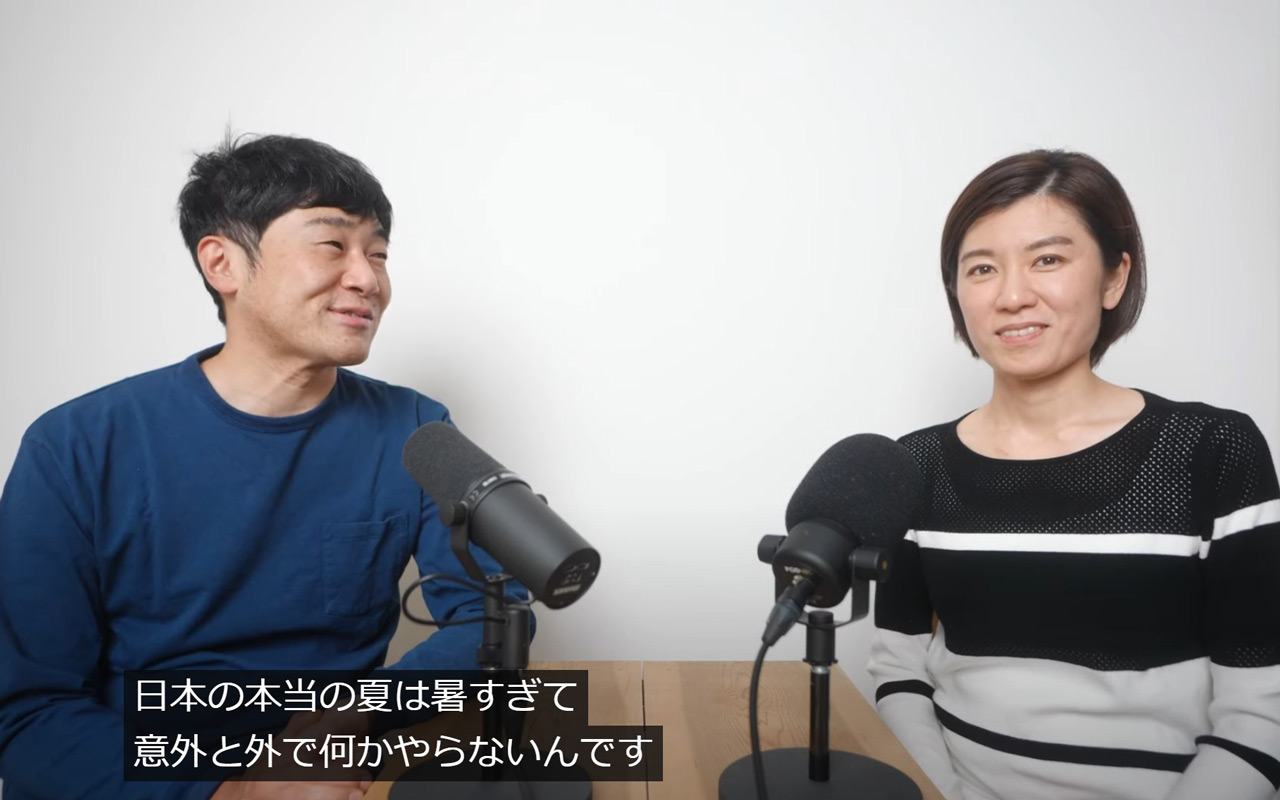
Easy Japanese is a podcast YouTube channel that's also available on a wide range of podcast services, aimed at providing practice for Japanese learners around the N3 level. The intro promises no script, no editing, just natural, simple Japanese, and that's what's provided. Started in January of 2021, hosts Masa and Asami have now logged hundreds of podcasts between then and now, covering a wide range of topics. There's no English used, but instead the hosts try to stick to simple words, or explain concepts in simple terms when necessary. Since launching, the podcast has become a video podcast on YouTube, and every episode from the very beginning has worked well with the closed-captioning provided on YouTube if you'd like to look at subtitles while you listen. Additionally, the pair livestreams twice-weekly, adding even more content to an already rich archive.
Among a crowded and ever-growing podcast pool for Japanese language learners, Easy Japanese manages to stand out as an extremely high-quality and useful resource for Japanese learners. By catering to Intermediate learners rather than absolute beginners, they've created a resource with a much longer shelf life, while still being fairly accessible. Easy Japanese sort of strides the perfect balance between natural, unscripted speech, while still being clear, articulate, and simple enough to be comprehensible to a large number of students. This is a great offering for anyone looking for a bit more practice, and really, who isn't?
| What sort of topics do they cover? | Various, from "Summer Solstice" to "School Entrance Ceremony" |
| Is it scripted or unscripted? | Unscripted |
| Is it a monologue, or conversation? | Monologue in the early episodes, conversation in the later episodes |
| Is there a transcript or accompanying material? | Transcript (Free), but only in the YouTube Closed Captioning |
| What's the average length of an episode? | ~10 minutes |
Ian’s Review
Easy Japanese is a great podcast for intermediate learners looking for some high-quality listening practice. It’s clear how much the hosts Masa and Asami care about the show, with a strong emphasis placed on production value. I find they’re both very easy to listen to (as the name implies!) while still remaining engaging and thoughtful. Especially for learners looking to get into conversation-style podcasts, Easy Japanese is an easy recommendation.
Learn Japanese with Noriko
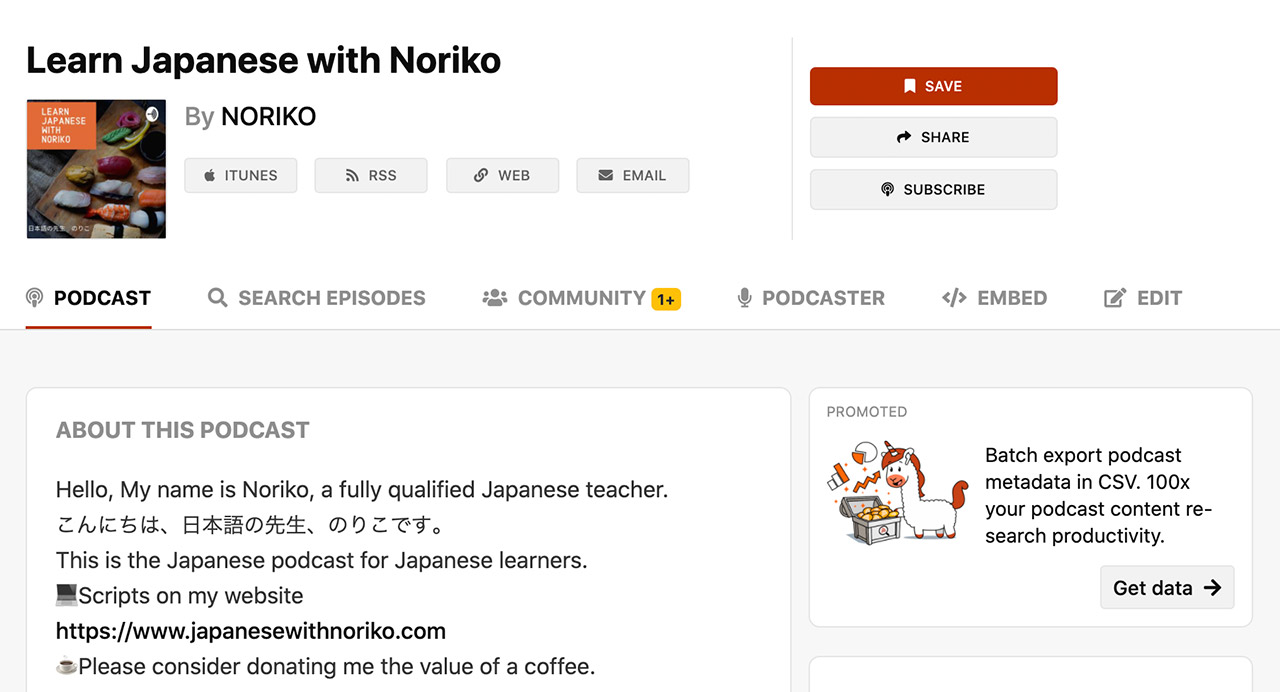
Following the mold of great podcasts hosted by Japanese teachers, Learn Japanese with Noriko is no exception. Updated almost every-other day, Learn Japanese with Noriko has grown to over a hundred episodes, and has a second season.
Noriko-sensei’s podcast is another monologue-style series, but her speech is only slightly slowed. For the most part, her speech is not limited by grammar, vocabulary, or speed, making it good practice for intermediate learners. Additionally, since the episodes are closer to 10 minutes each, it allows you to settle into the study a bit more, and forces you to stay engaged.
Additionally, there is a Patreon where members are given access to a wider range of transcripts and episodes.
| What sort of topics do they cover? | Various, from "Netflix's 'Old Enough'" to the JLPT |
| Is it scripted or unscripted? | Unscripted |
| Is it a monologue, or conversation? | Monologue |
| Is there a transcript or accompanying material? | Transcript (Some Free, Some Paid) |
| What's the average length of an episode? | ~10 minutes |
Ian’s Review
Learn Japanese with Noriko is another great entry into the world of Japanese language learning podcasts. As a Japanese teacher, she’s able to remain considerate of learners’ abilities, while not restricting her own speech so much to make the podcast stale. I wish the production quality was a little higher, as Noriko’s voice sounds a bit tinny, but it’s not too difficult to get used to it.
Thinking in Japanese
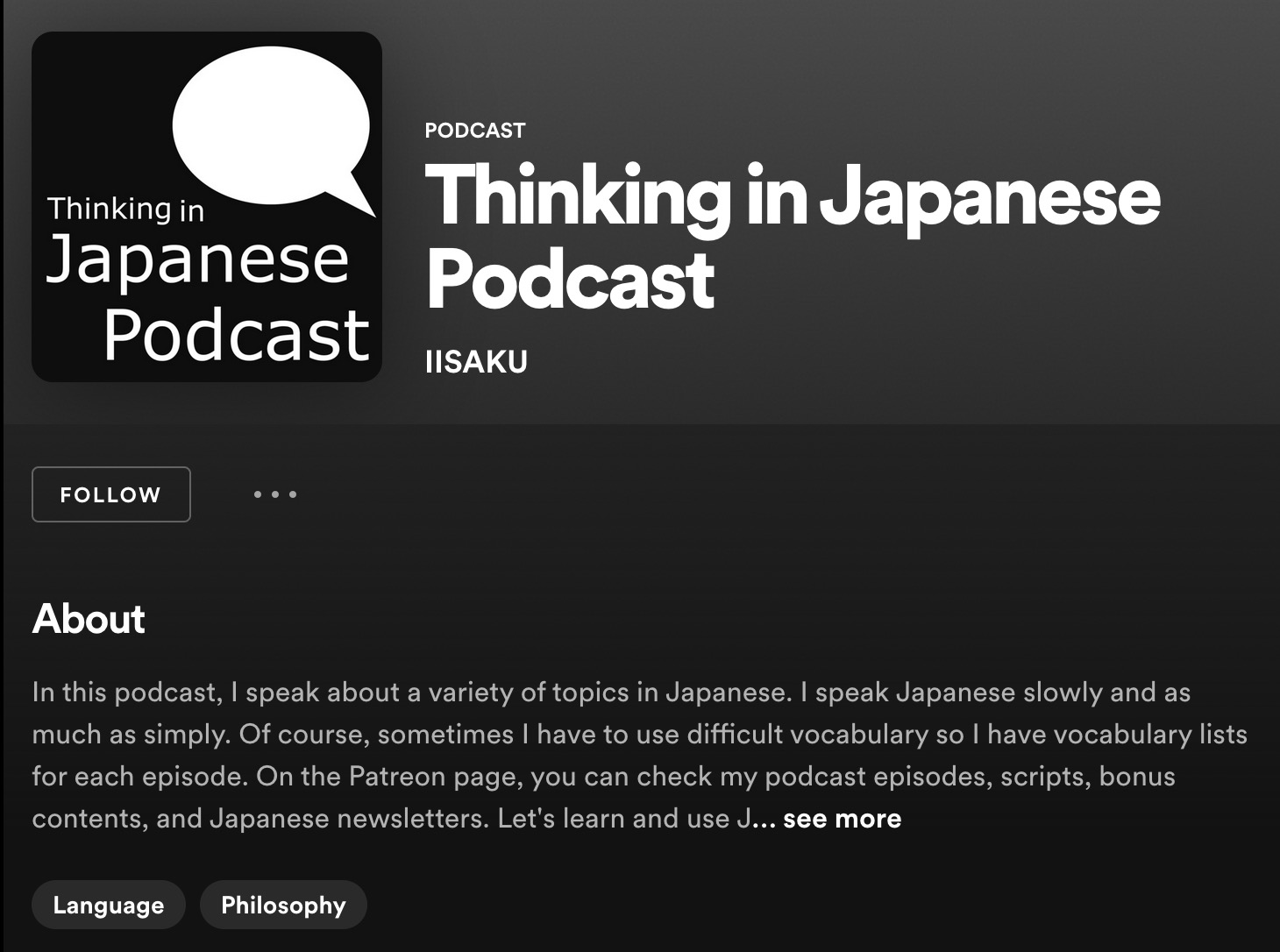
Thinking in Japanese, a podcast by Iisaku, deviates from the standard Japanese language learning podcast in a few key ways. For one, while Iisaku speaks slowly, they do so by pausing more between words and phrases, rather than slowing down their entire speech like some other podcasts do, which is more natural and makes it easier to understand. Secondly, rather than some of the generic sorts of topics discussed in other Japanese language learning podcasts, or simply chatting, Iisaku covers both topics in Japanese language learning, such as Japanese pronunciation and tips on specific types of practice, and philosophical discussions from their perspective. Because of this, it's sort of like a language learning multiplier: you're practicing by listening, and by listening, you might learn something new about Japanese practice too!
While the production quality is nothing to write home about, Iisaku also offers a patreon for $5/month to give listeners access to vocabulary lists and bonus articles. Thinking in Japanese is a unique podcast, pairing beginner-friendly pacing and vocabulary with interesting concepts meant to expand your language ability through the content in itself. For language learners who love the process of learning, Thinking in Japanese is a great option.
| What sort of topics do they cover? | Japanese language learning, psychology, philosophy, such as "Can Adults Make new Habits?" and "To Be a Good Talker, You Have to Be a Good Listener" |
| Is it scripted or unscripted? | Unscripted |
| Is it a monologue, or conversation? | Monologue |
| Is there a transcript or accompanying material? | Transcript (Paid) |
| What's the average length of an episode? | ~10 minutes |
Ian’s Review
I really like Thinking in Japanese. While the speech is definitely slowed, the advanced and interesting topics and vocabulary more than make up for it. If you find this sort of dialogue interesting, you’ll certainly find Thinking in Japanese to be worth your time. After all, the best listening practice is the one you want to do!
Intermediate: A Need for Speed!
In this group, the name of the game is speed. Not "fast," of course, but these podcasts are the first in the intermediate tier to get closer to native speed. Additionally, many of the episodes tend to be longer, so they require you to hold your attention for a longer period of time.
I think you can think of listening practice sort of like music practice. You might start really slow, just making sure you're not going to make any mistakes, and then slowly increase the speed as your abilities increase. And with these podcasts that expect you to do that for longer, or are conversations, or use more complicated grammar and vocabulary, that makes it even more of a challenge.
Nihongo Con Teppei
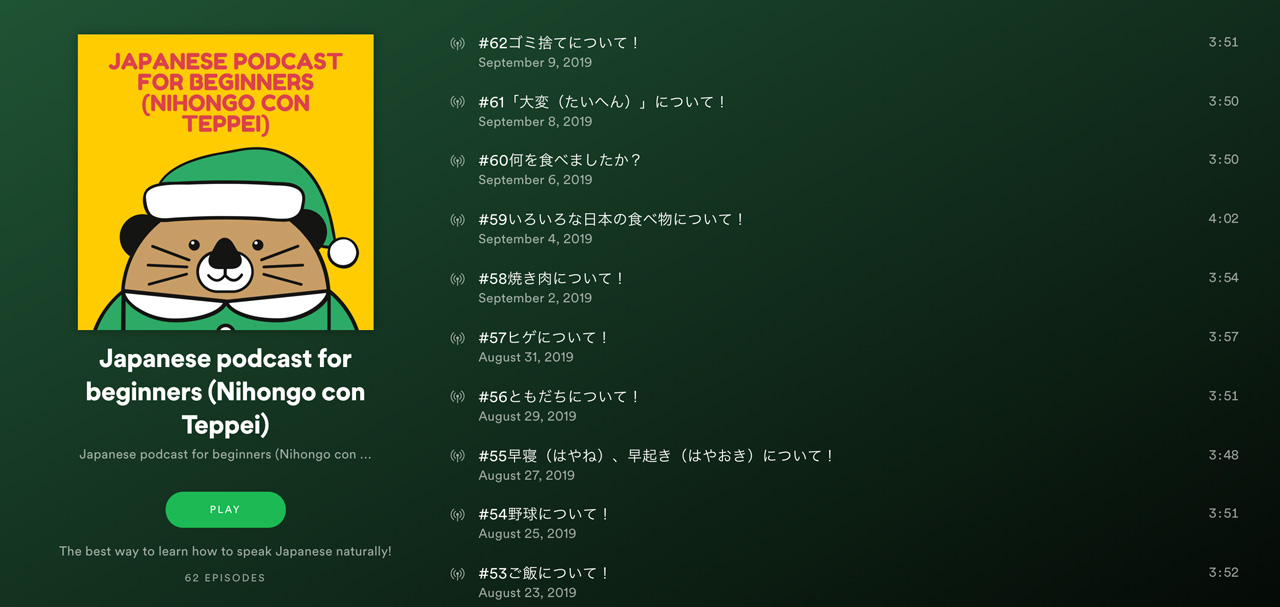
If you’ve heard of any Japanese podcast for language learners, chances are it’s Nihongo Con Teppei. In addition to being a native Japanese speaker, Teppei speaks Spanish and English, the former of which being where the name comes from ("con" meaning "with" in Spanish).
After starting the series several years ago, Teppei has gone on to record almost a podcast a day, leading to hundreds and hundreds of episodes, and even a beginner and advanced series, along with collaborative podcasts with other teachers like Noriko sensei.
The topics covered in Nihongo Con Teppei are varied, and episodes tend to run on the longer side, with many clocking in around 20 minutes. His speech varies too, from slightly slowed to normal speed.
Teppei does a good job as host, and remains interesting and engaging regardless of topic. He’s funny, and several recurring jokes help give Nihongo Con Teppei such a welcoming atmosphere. For Japanese learners looking for more immersion material, Teppei is hard to beat.
| What sort of topics do they cover? | Various, from "The Best Way to Study" to "The Level of Languages" |
| Is it scripted or unscripted? | Unscripted |
| Is it a monologue, or conversation? | Monologue |
| Is there a transcript or accompanying material? | None |
| What's the average length of an episode? | ~15 minutes |
Ian’s Review
If you’ve ever looked for Japanese language learning podcast recommendations, chances are you’ve come across Nihongo Con Teppei. And with good reason! Teppei is funny and engaging, and with hundreds of hours of free audio content spread across multiple different skill-levels, there’s something for everyone. Teppei’s intermediate podcast, the regular Nihongo Con Teppei is a staple of study routines everywhere, and seems likely to remain that way.
The Real Japanese Podcast
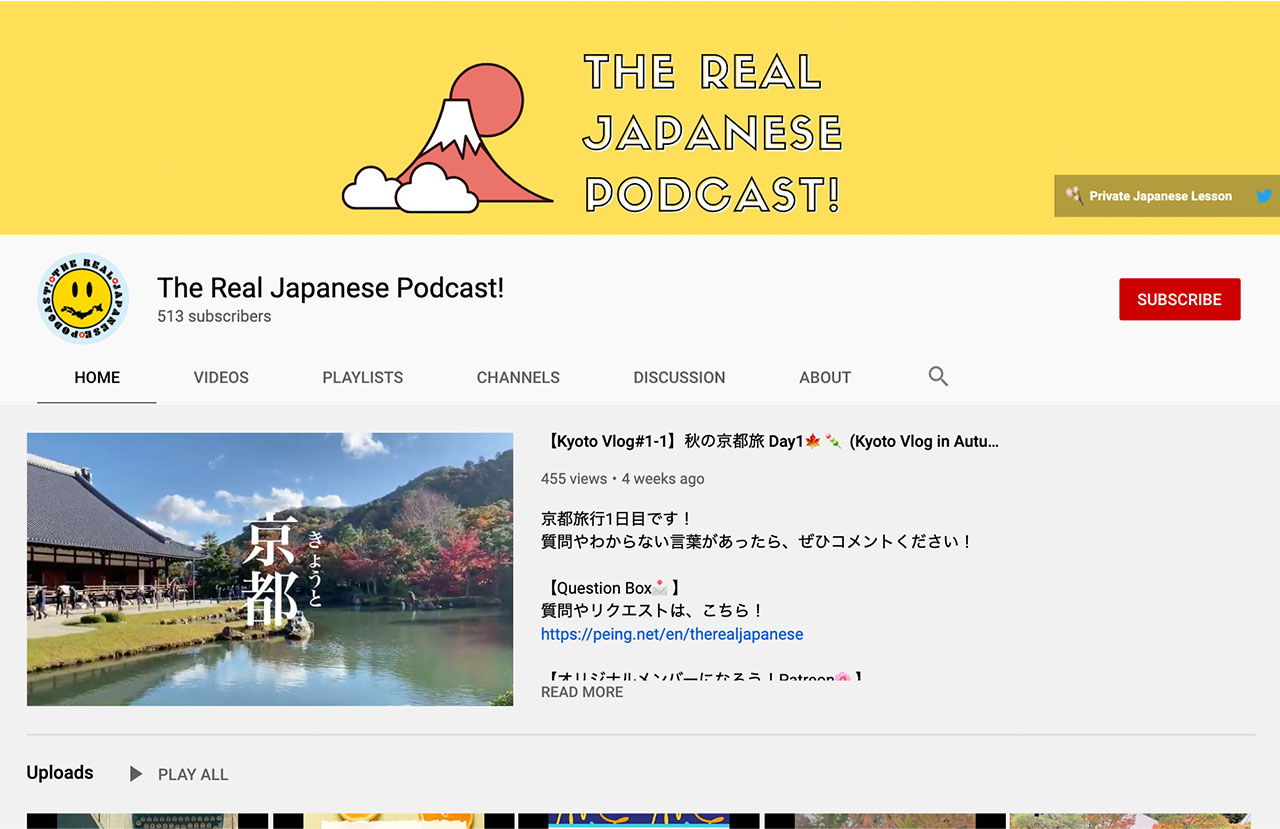
The Real Japanese Podcast, launched in 2020, is a monologue-style podcast hosted by Japanese teacher Haruka. The podcasts tend to mirror videos from her YouTube channel, where she spends time speaking unscripted on a certain topic. Despite this, transcripts are available should you want to check your comprehension, or read along.
While the format is similar to other monologue-style podcasts, Haruka’s natural speed and unscripted speech make this podcast well worth your time. She talks about events from her life, such as time spent abroad in Canada, personal takes on social issues, as well as general interest topics on Japan and Japanese culture. This more personal touch makes The Real Japanese Podcast feel more tailor-made rather than how other series can feel scattershot at times, and keeps the conversation engaging even if you’re not well versed on the topic.
Finally, her natural speech makes this a great listen for intermediate Japanese learners. With so much of a focus on beginner-level materials, it can be hard to find something that’s well suited for intermediate learners, but The Real Japanese Podcast definitely fits the bill.
| What sort of topics do they cover? | Life events, personal takes on social issues, and general Japan-related topics, such as "Manga Cafe" and "Male and Female Speech in Japanese" |
| Is it scripted or unscripted? | Unscripted |
| Is it a monologue, or conversation? | Monologue |
| Is there a transcript or accompanying material? | Transcript (Free) |
| What's the average length of an episode? | ~15 minutes |
Ian’s Review
The Real Japanese Podcast is a solid addition to the growing field of intermediate-focused Japanese podcasts. While the format is very familiar to Japanese learners at this point, her personal look at topics and natural speech elevates this podcast among some of its peers.
The Miku Real Japanese Podcast
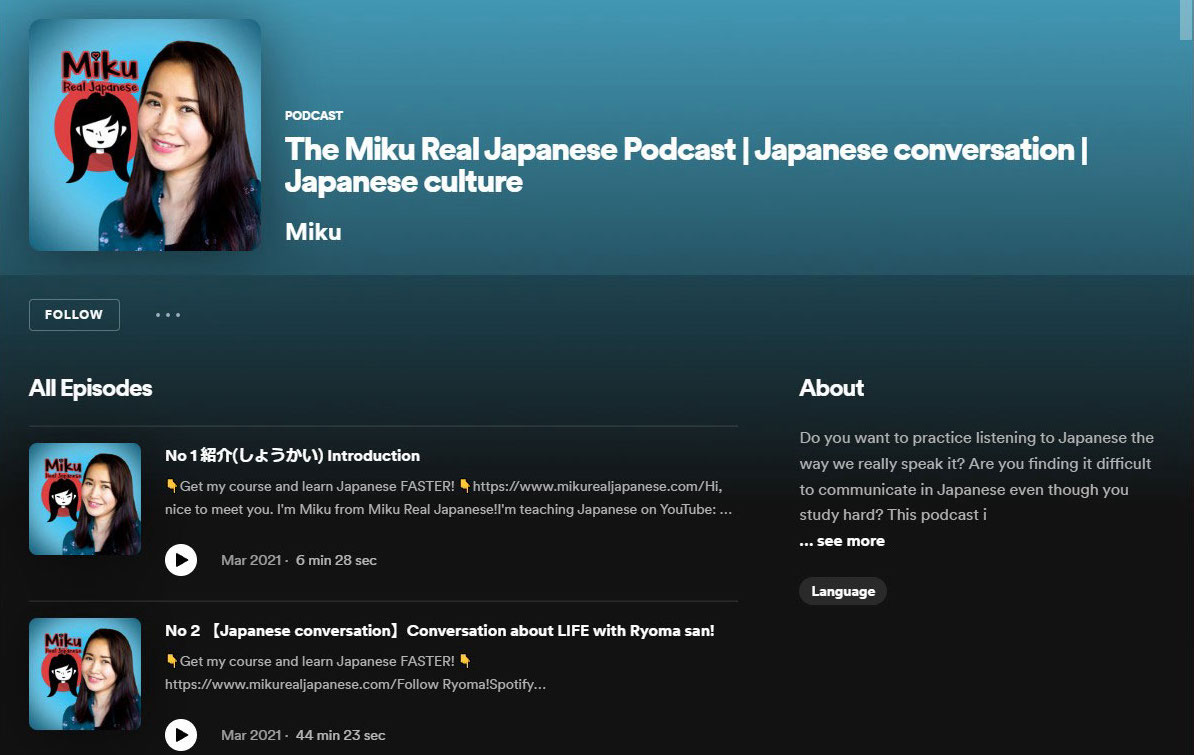
Not to be confused with "The Real Japanese Podcast," The Miku Real Japanese Podcast comes from the host of popular Japanese language learning channel, Miku Real Japanese, who we wrote about for our YouTube Grammar Channel recommendations article.
Like her excellent YouTube channel, her podcast is also very high-quality. Rather than focus on grammar or a smattering of topics, The Miku Real Japanese Podcast features a lot of fascinating conversations with guests that Miku knows. There’s one about life in Okinawa for example, and more than one episode about Miku’s experiences living abroad.
Episodes tend to run slightly on the longer side, with these conversations coming in around 30 minutes a piece. There are also a sprinkling of other episodes Miku hosts alone in the mix, often closer to about 10 minutes.
For intermediate Japanese learners looking to get into conversation practice or start listening comprehension practice with more than one person, The Miku Real Japanese podcast is a great way to expand your horizons.
| What sort of topics do they cover? | Primarily conversations, such as "Why do Okinawa people live long? With Kiki-san" |
| Is it scripted or unscripted? | Unscripted |
| Is it a monologue, or conversation? | Both monologues and conversations |
| Is there a transcript or accompanying material? | None |
| What's the average length of an episode? | ~10 minutes (with conversations running longer, sometimes around 30 minutes) |
Ian’s Review
Much like her YouTube channel, I think The Miku Real Japanese Podcast is great. These sorts of long conversations are difficult to find elsewhere at this level. Miku does a great job of keeping things relatively easy to understand, while not limiting her or her guests’ speech too much, and still making the conversations fun and interesting to listen to. I only wish there were more episodes!
YUYUの日本語 Podcast
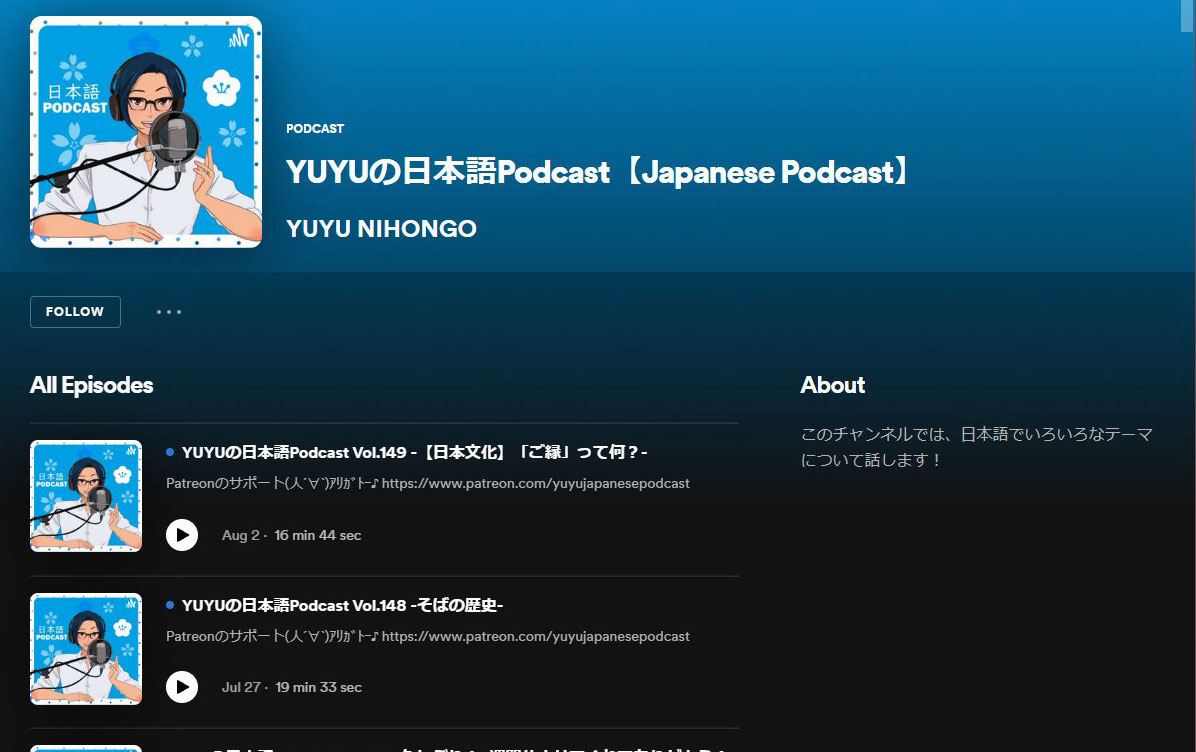
Launched in January of 2021, YUYU’s podcast and YouTube channel have since exploded with new content, and built up a ton of new fans along the way. Host YUYU is a Japanese teacher, who through a vtuber avatar does long live streams on YouTube among other content.
THe podcast is similarly broad. There are episodes on Japanese history, Japanese language, and of course pop culture, which is perhaps the content YUYU has become most well-known for.
Episodes vary wildly in length, with some as short as 10 minutes, all the way up to a half-hour or more. YUYU is a kind and thoughtful host, with very clear audio, and an easy-to-understand way of speaking. If you’re looking to get your pop culture fix while you study, look no further than YUYUの日本語 Podcast.
| What sort of topics do they cover? | Japanese culture, history, and pop culture, such as "Three quotes from the Monogatari series that saved my life" |
| Is it scripted or unscripted? | Unscripted |
| Is it a monologue, or conversation? | Monologue |
| Is there a transcript or accompanying material? | Transcript (Free) via YouTube CC or Subtitles on certain videos |
| What's the average length of an episode? | ~30 minutes |
Ian’s Review
While it’s not rare anymore to find Japanese teachers who will talk about pop culture, it is rare to find someone who expresses the same sort of earnest enjoyment and enthusiasm about the topic such as YUYU. This infuses the podcasts with a lot of fun, and of course keeps them very engaging if you share the same interests. Listening to YUYU feels like listening to a friend, which is about the highest compliment I can bestow.
Upper Intermediate and Beyond
In this final section, your abilities will really be tested. These podcasts feature conversations at or nearly at native speed, or are simply made for native Japanese listeners. With that, this section is a bit of a challenge, at times pushing beyond the "intermediate" label. But don't worry. If some of these are too difficult now, with diligent practice, before you know it they'll be a piece of cake. Just make sure you're not pushing too far, and instead finding something level-appropriate to work through consistently.
Japanese with Teppei and Noriko
If you’ve looked into podcasts for Japanese language learners before, you’re probably familiar with both Teppei and Noriko sensei. But did you know they have a collaborative podcast? Well, they do, and it lives up to the quality you’d expect from this pair of veteran podcasters.
As you might expect, this podcast is very similar to their solo work, featuring a variety of topics. However, with the both of them they discuss these topics at more or less natural speed, making this podcast more suited for intermediate learners rather than beginners.
Like some similar podcasts, it’s a great option for those struggling to comprehend native conversations, though it probably shouldn’t be your first practice in this field.
| What sort of topics do they cover? | Various, from "About Heat" to "About Earthquakes" |
| Is it scripted or unscripted? | Unscripted |
| Is it a monologue, or conversation? | Conversation |
| Is there a transcript or accompanying material? | None |
| What's the average length of an episode? | ~20 minutes |
Ian’s Review
In this podcast, Teppei and Noriko combine their powers to make a podcast for Japanese learners looking to step up their listening comprehension game. Unlike their solo podcasts, I find this one to be a little more difficult, with the speed of their conversation, and the interjections, but since they’re both teachers, they still do a good job at making sure it’s not inaccessible.
4989 American Life Podcast
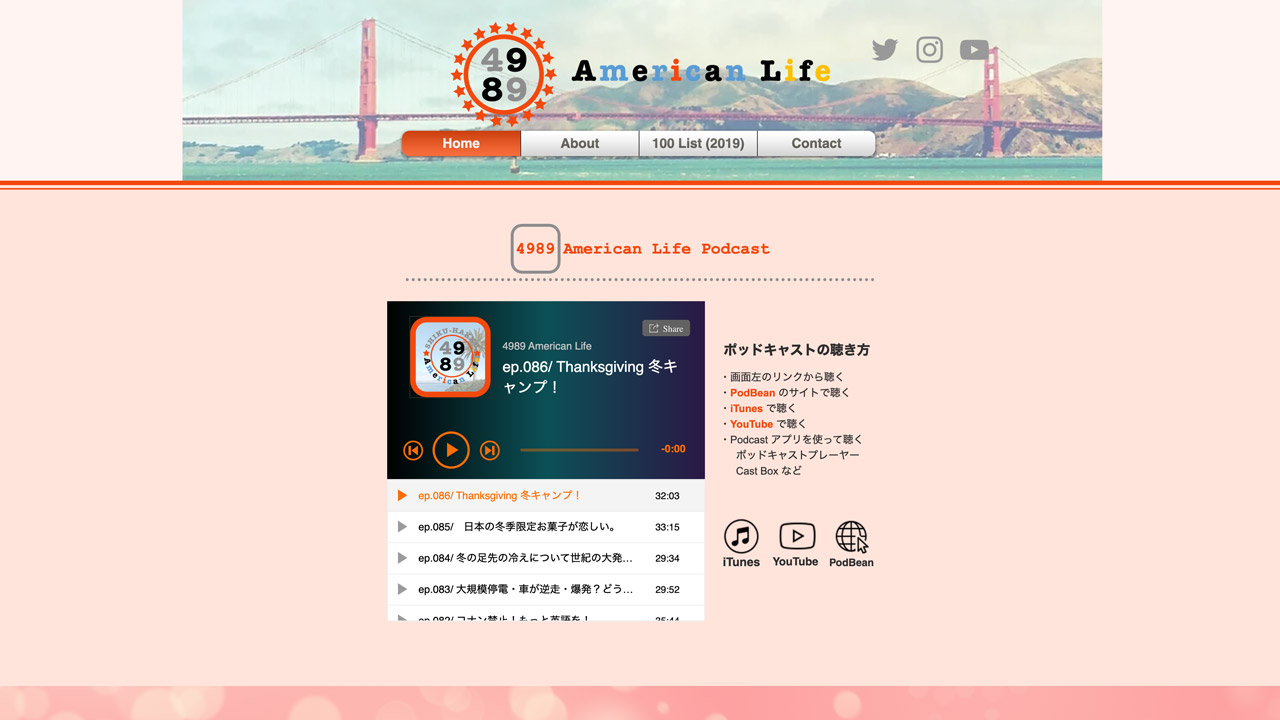
Borrowing their name from a Japanese idiom pronounced "shikuhakku," which means "struggle" or "suffering," 4989 American Life Podcast aims to describe the difficulties of being a Japanese person living in America. But it’s not all doom and gloom; actually, 4989 American Life is a fascinating look at some of the cultural differences between Japan and the US.
Made primarily for native Japanese speakers, you won’t find very much here to support Japanese learners, though more recently transcripts for the episodes have been added to the official website. Instead, 4989 American Life is almost like a listening comprehension test. But don’t get discouraged!
Host Utako speaks clearly, though at normal speed. She has some interesting insights into living abroad, which might be helpful to those who hope to live in Japan one day. Episodes tend to run about 30 minutes, so buckle in, and let’s put our listening to the test.
| What sort of topics do they cover? | Various topics about life abroad in the US, such as "American Restaurants" |
| Is it scripted or unscripted? | Unscripted |
| Is it a monologue, or conversation? | Monologue |
| Is there a transcript or accompanying material? | Transcript (Free) |
| What's the average length of an episode? | ~30 minutes |
Ian’s Review
4989 American Life is a really interesting podcast, and stands somewhat alone on this list. Intended for native Japanese speakers, 4989 American Life is one of the most challenging podcasts recommended to Japanese learners. Even so, it’s made to be comprehensible, so stick with it if you’re having trouble. What you’ll find is an interesting look at cultural differences between Japan and the US, and some serious practice for your listening abilities, as well.
Let's Learn Japanese from Small Talk
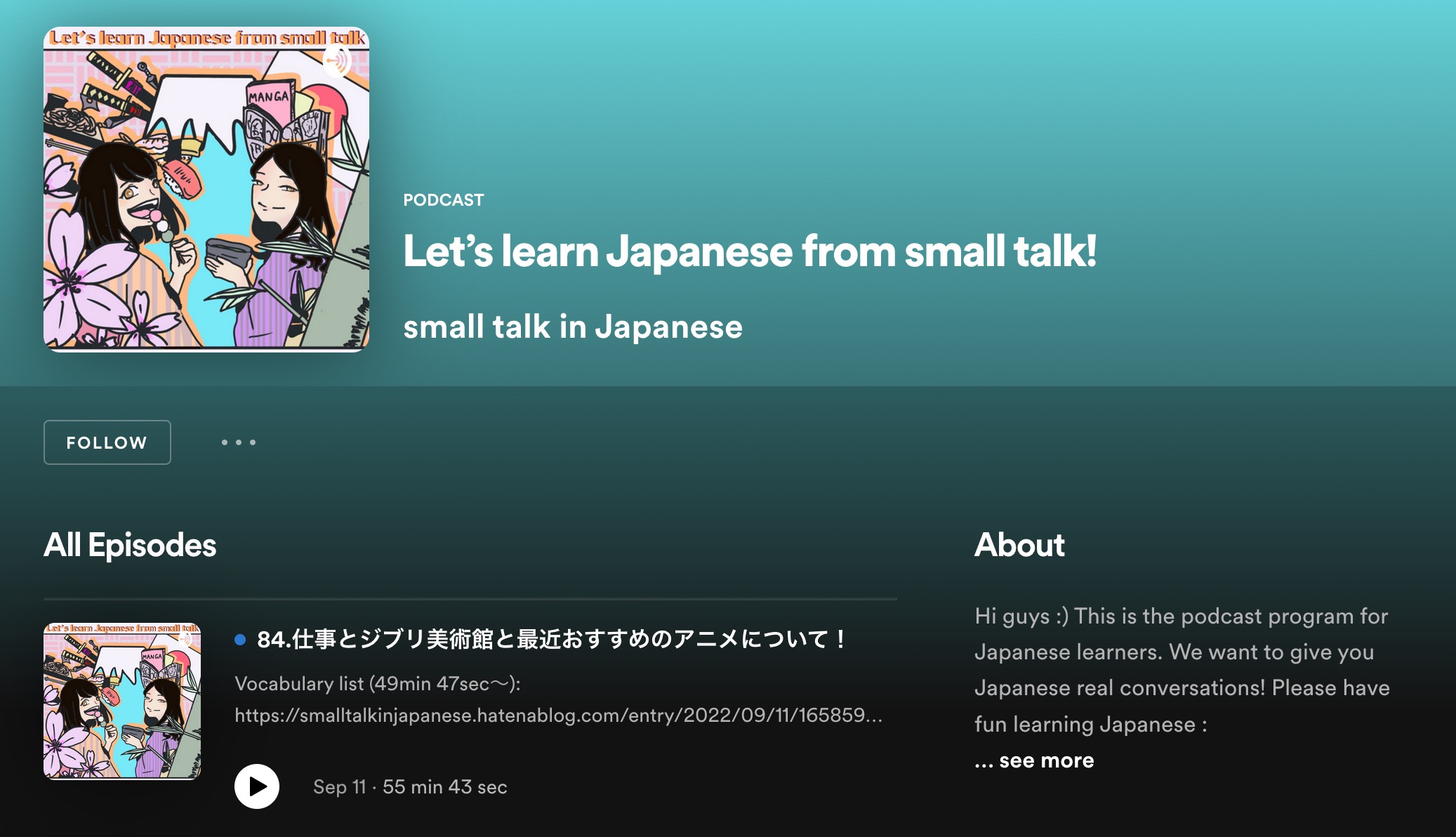
If you're looking for a podcast that offers authentic, everyday Japanese, we recommend you check out Let's Learn Japanese From Small Talk! The podcast is hosted by two native speakers of Japanese, and they cover a wide range of interesting topics about modern life in Japan. We covered this podcast in another Japanese Learning Resources article a year ago, but it has really come into its own since then!
One of my favorite things about the podcast is how well the hosts provide vocabulary support for listeners. Instead of simplifying their Japanese, they provide English translations of difficult words, or explain what words mean using other words in Japanese. At the end of each episode, one of the hosts slowly pronounces each word covered in the episode, leaving enough time in between for listeners to pronounce the words after her. Vocabulary lists for each episode are posted on the podcast blog, which makes this a really great study tool!
I would recommend this podcast to upper-intermediate and advanced learners, however a more beginner level learner could try studying the vocabulary list before listening to the podcast to see if it is more accessible that way. In any case, if you're in need of an enjoyable and informative Japanese podcast, give it a shot!
| What sort of topics do they cover? | Various, from "Our Working Lives" to "Recently Seen Movies and Magazines" |
| Is it scripted or unscripted? | Unscripted |
| Is it a monologue, or conversation? | Conversation |
| Is there a transcript or accompanying material? | Vocab lists (Free) |
| What's the average length of an episode? | ~30 minutes |
Ian’s Review
Let’s Learn Japanese from Small Talk is a lot of fun. Originally started while the hosts were studying abroad in London, the show has continued into their adult lives. As two friends, the conversations they have are very natural and easy-flowing, making this about as close to a native conversation with your peers as you can get. That said, they do provide vocabulary lists, and break down words or phrases from time to time.
Conclusion
Hopefully you've seen the wide range of podcasts available for intermediate Japanese language learners and beyond. This list comprises a larger range of difficulty than my previous beginner level roundup, so hopefully there's a few podcasts here that can take you from intermediate into advanced.
I think the best listening practice is the one you want to do, so if there's a podcast with hosts or topics you like, settle in. That way, you'll stay engaged and actively listening, getting the most for your practice. That said, don't be afraid to readjust to find something more suited to your level. If you're struggling to comprehend each sentence, that's probably a good sign you should try something a bit easier for a while as you build up your abilities.
Hopefully between this list and the beginner version, you've found something that strikes your fancy, and even better if you've found a few podcasts you're interested in that you can follow along during your journey. Go for a nice walk, and get practicing!
